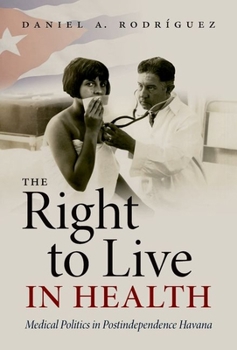The Right to Live in Health: Medical Politics in Postindependence Havana
(Part of the Envisioning Cuba Series)
Select Format
Select Condition 
Book Overview
Daniel A. Rodr guez's history of a newly independent Cuba shaking off the U.S. occupation focuses on the intersection of public health and politics in Havana. While medical policies were often used to further American colonial power, in Cuba, Rodr guez argues, they evolved into important expressions of anticolonial nationalism as Cuba struggled to establish itself as a modern state. A younger generation of Cuban medical reformers, including physicians, patients, and officials, imagined disease as a kind of remnant of colonial rule. These new medical nationalists, as Rodr guez calls them, looked to medical science to guide Cuba toward what they envisioned as a healthy and independent future.
Rodr guez describes how medicine and new public health projects infused republican Cuba's statecraft, powerfully shaping the lives of Havana's residents. He underscores how various stakeholders, including women and people of color, demanded robust government investment in quality medical care for all Cubans, a central national value that continues today. On a broader level, Rodr guez proposes that Latin America, at least as much as the United States and Europe, was an engine for the articulation of citizens' rights, including the right to health care, in the twentieth century.
Rodr guez describes how medicine and new public health projects infused republican Cuba's statecraft, powerfully shaping the lives of Havana's residents. He underscores how various stakeholders, including women and people of color, demanded robust government investment in quality medical care for all Cubans, a central national value that continues today. On a broader level, Rodr guez proposes that Latin America, at least as much as the United States and Europe, was an engine for the articulation of citizens' rights, including the right to health care, in the twentieth century.
Format:Paperback
Language:English
ISBN:1469659735
ISBN13:9781469659732
Release Date:August 2020
Publisher:University of North Carolina Press
Length:288 Pages
Weight:0.99 lbs.
Dimensions:0.7" x 6.1" x 9.2"
Customer Reviews
0 rating





